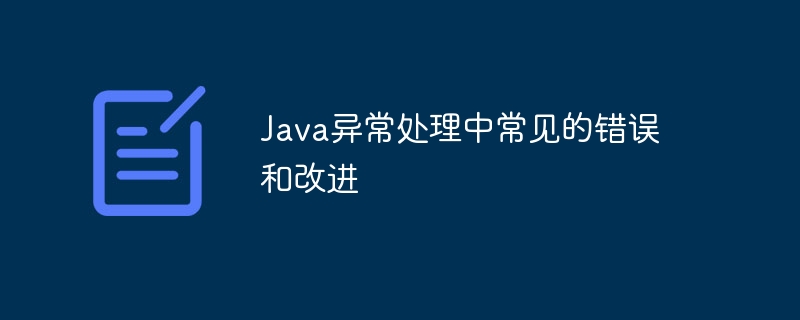Common mistakes and improvements in Java exception handling
Common exception handling errors include ignoring exceptions, handling exceptions in general, improperly throwing exceptions, and throwing instead of returning. Improvements include always handling exceptions, using specific exception handling, creating meaningful custom exceptions, and considering the use of return values. By following these improvements, you can make your Java programs more robust and debuggable.

Common mistakes and improvements in Java exception handling
Exception handling is an important concept in Java that can help developers Handle program errors gracefully and prevent application crashes. However, some common errors are often encountered in exception handling, which not only affect the robustness of the program, but also make debugging difficult.
Common mistakes:
- Ignore exceptions: Unhandled exceptions will cause the program to crash or behave unexpectedly.
-
General exception handling: Using a broad exception handler such as
catch (Exception e)will hide the specific exception type, затрудняет отладку. - Inappropriate exception throwing: When throwing custom exceptions, make sure they are as specific and informative as possible.
- Throw instead of return: To report errors from a method, exception throwing is often used instead of returning an error code or value.
Improvements:
1. Always handle exceptions
Always use try-catch or try-with-resources statement handles all checked exceptions. If the exception cannot be handled in the method, throw it to the caller.
2. Use specific exception handling
Use a specific exception handler (such as catch (IOException e)) to get exception-related information Information about the specific type and cause, making debugging easier.
3. Create meaningful custom exceptions
When creating custom exceptions, make sure they contain enough information about the error and inherit from an appropriate base class Exception (such as RuntimeException or Exception).
4. Consider using return values
In some cases, it may be more appropriate to use return values rather than exceptions to indicate errors. This simplifies the code and reduces the overhead of exceptions.
Practical case:
Consider the following sample code:
public void processFile(String path) {
try {
// 打开文件并进行处理
} catch (FileNotFoundException e) {
// 未找到文件,打印错误信息并返回
} catch (Exception e) {
// 发生未知错误,打印错误信息并抛出异常
}
}There is an error in this code: it uses general exception handling (catch (Exception e)), which will hide the actual exception type. The corrected version is as follows:
public void processFile(String path) {
try {
// 打开文件并进行处理
} catch (FileNotFoundException e) {
// 未找到文件,打印错误信息并返回
} catch (IOException e) {
// 文件相关错误,打印错误信息并抛出异常
}
}By using a specific exception handler, the code now correctly distinguishes between FileNotFoundException and other file-related errors, making debugging easier.
The above is the detailed content of Common mistakes and improvements in Java exception handling. For more information, please follow other related articles on the PHP Chinese website!

Hot AI Tools

Undresser.AI Undress
AI-powered app for creating realistic nude photos

AI Clothes Remover
Online AI tool for removing clothes from photos.

Undress AI Tool
Undress images for free

Clothoff.io
AI clothes remover

AI Hentai Generator
Generate AI Hentai for free.

Hot Article

Hot Tools

Notepad++7.3.1
Easy-to-use and free code editor

SublimeText3 Chinese version
Chinese version, very easy to use

Zend Studio 13.0.1
Powerful PHP integrated development environment

Dreamweaver CS6
Visual web development tools

SublimeText3 Mac version
God-level code editing software (SublimeText3)

Hot Topics
 Square Root in Java
Aug 30, 2024 pm 04:26 PM
Square Root in Java
Aug 30, 2024 pm 04:26 PM
Guide to Square Root in Java. Here we discuss how Square Root works in Java with example and its code implementation respectively.
 Perfect Number in Java
Aug 30, 2024 pm 04:28 PM
Perfect Number in Java
Aug 30, 2024 pm 04:28 PM
Guide to Perfect Number in Java. Here we discuss the Definition, How to check Perfect number in Java?, examples with code implementation.
 Random Number Generator in Java
Aug 30, 2024 pm 04:27 PM
Random Number Generator in Java
Aug 30, 2024 pm 04:27 PM
Guide to Random Number Generator in Java. Here we discuss Functions in Java with examples and two different Generators with ther examples.
 Armstrong Number in Java
Aug 30, 2024 pm 04:26 PM
Armstrong Number in Java
Aug 30, 2024 pm 04:26 PM
Guide to the Armstrong Number in Java. Here we discuss an introduction to Armstrong's number in java along with some of the code.
 Weka in Java
Aug 30, 2024 pm 04:28 PM
Weka in Java
Aug 30, 2024 pm 04:28 PM
Guide to Weka in Java. Here we discuss the Introduction, how to use weka java, the type of platform, and advantages with examples.
 Smith Number in Java
Aug 30, 2024 pm 04:28 PM
Smith Number in Java
Aug 30, 2024 pm 04:28 PM
Guide to Smith Number in Java. Here we discuss the Definition, How to check smith number in Java? example with code implementation.
 Java Spring Interview Questions
Aug 30, 2024 pm 04:29 PM
Java Spring Interview Questions
Aug 30, 2024 pm 04:29 PM
In this article, we have kept the most asked Java Spring Interview Questions with their detailed answers. So that you can crack the interview.
 Break or return from Java 8 stream forEach?
Feb 07, 2025 pm 12:09 PM
Break or return from Java 8 stream forEach?
Feb 07, 2025 pm 12:09 PM
Java 8 introduces the Stream API, providing a powerful and expressive way to process data collections. However, a common question when using Stream is: How to break or return from a forEach operation? Traditional loops allow for early interruption or return, but Stream's forEach method does not directly support this method. This article will explain the reasons and explore alternative methods for implementing premature termination in Stream processing systems. Further reading: Java Stream API improvements Understand Stream forEach The forEach method is a terminal operation that performs one operation on each element in the Stream. Its design intention is






